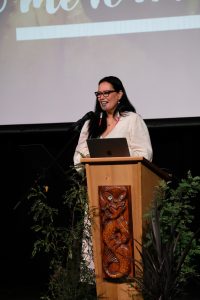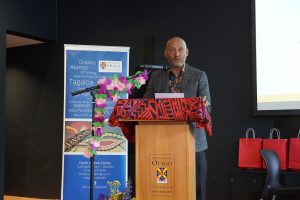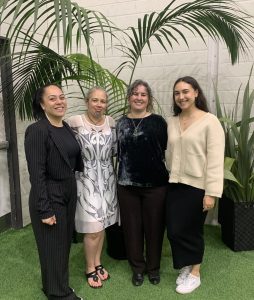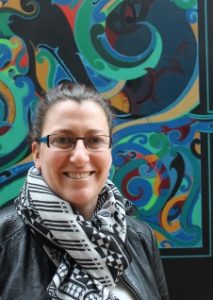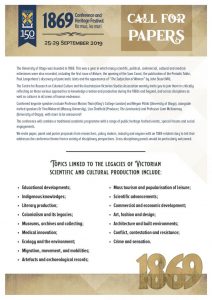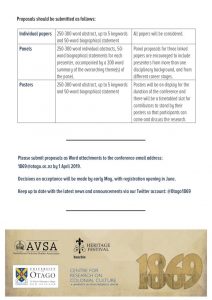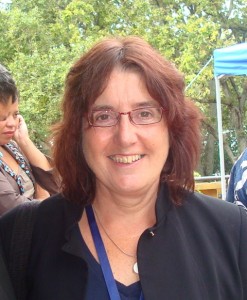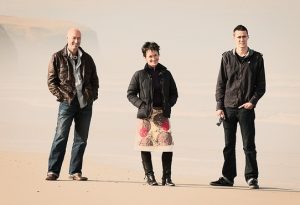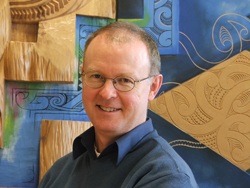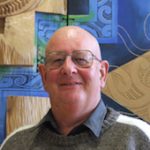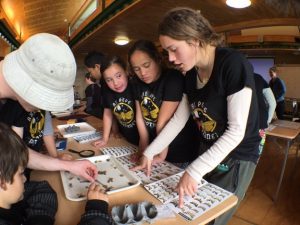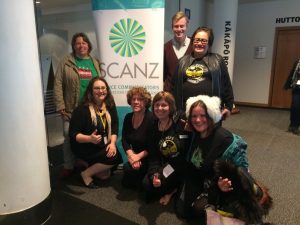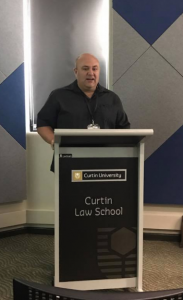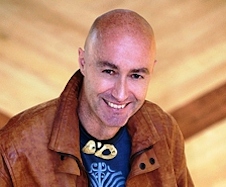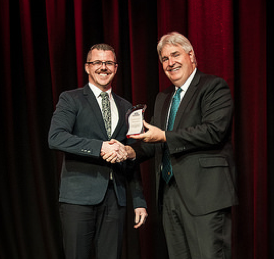Te Hiringa o te pao
Inātata nei, i rarau atu kā kaimanako o te reo ki tētahi hui taumata ki Te Kura o Ōruapaeroa, Ōtautahi 23-24 Māehe 2024. Ko Terea Te Waka te hui taumata e kōrero nā, he mea whakatū e Te Pae Motuhake o Te Tai Toka. He mea tautoko hoki tēnei hui e Te Mātāwai hai whakaohooho, hai whakaaweawe i kā reaka o nāianei kia tika te kawe i kā ōhākī tuku iho, kia whakairohia te anamata mō ā tātau tamariki mokopuna.
Nā ko tētahi o kā kaikōrero matua o te hui nā, ko Kare Tipa. He kaiako ia ki Ōtākou Whakaihu Waka, waihoki, koni atu i te kahuru tau ia e whakaako ana ki kā Kura Reo. He taiwahine a Kare i pakeke mai i Te Tai o Araiteuru, i raro hoki i āna mauka kōrero. Ko Moeraki ake te papamoe ō ōna tīpuna, heoi, nō te tokorima taotao o Tahu tou tēnei īnati.
Kaupapa Kōrero: Te Hirika o te pao!
Ko tā Kare he hāpai, he whakatinana, he whakatauria i te reo me ōna tikaka. I te nuika o te wā kai ruka i te horopaki o ‘Te tū o te wahine nō Kāi Tahu’. I tō Kare whai i te reo, ko KMK hoki tētahi puna reo i whai waahi atu a Kare i roto i kā tau. Ko tōhona takeka pūkeka, kai kā mahi a Rukutia, arā ko kā mahi tito ko kā wānaka reo me kā wānanka tikaka Māori, otirā, kai te tuhia hoki tana tuhika kairaki. Nō nākuanei a Kare kua whakahaere wānaka hai whakapakari i kā pūkeka wāhine, pūkeka karaka, pūkeka pao, pūkeka mōteatea hoki, tae atu ki ētahi tikaka mahika kai.
PacTNet panel discussion & Pacific Voices Alumni celebration
On 27 November 2023, 20 years of the University of Otago’s Pacific Voices Postgraduate Symposium was celebrated with alumni, staff and current Pacific students at the Auahi Ora space in the Student Union Building. The evening programme began with an address from Tofilau Nina Kirifi-Alai, past manager of the Pacific Islands Centre and current Pacific Community Engagement Manager in Auckland. Tofilau shared reflections on establishing the symposium after seeing the need for postgraduate support in 2002 and gave encouraging words for organisers and students taking the symposium forward.
Her opening remarks were followed by an address from Deputy Vice Chancellor, Research & Enterprise, Professor Richard Blaikie who commented on Pacific research within the context of the University’s strategic direction. He enthusiastically supported Tofilau’s opening remarks and later engaged openly with the audience during the Q&A session at the end of the evening.
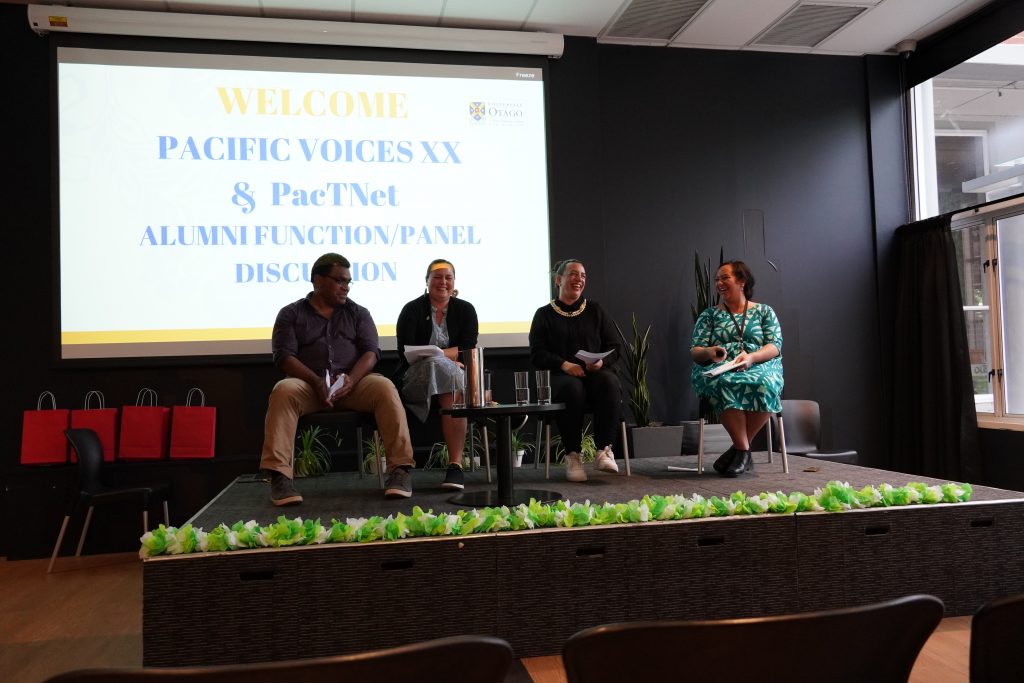
Panelists L-R Dr Tui Rakuita (Sociology), Dr Jess Pasisi (Te Tumu), Professor Rose Richards (Acting Director, Pacific Development Office & Co-Director of Coastal People, Southern Skies) and facilitator Dr Emma Powell (Te Tumu).
As a part of the programme, the symposium organisers and staff from the Pacific Development Office teamed up with the Pacific Thought Network (PacTNet) to arrange a public panel discussion. Earlier this year in May, PacTNet held its inaugural Pacific Lecture which was given by Tootooleaava Dr Fanaafi Aiono Le-Tagaloa and the panel gathered key Pacific thinkers from our university community to reflect on the ideas and comments made in the lecture. The panellists were Professor Rose Richards (Acting Director, Pacific Development Office & Co-Director of Coastal People, Southern Skies), Dr Tui Rakuita from Sociology and our very own, Dr Jess Pasisi. All of the panellists gave stimulating thoughts on Tootooleaava’s lecture, ranging from comment on Pacific leadership at the University of Otago, the significance of the diaspora to Pacific thinking, and the romanticism with which we hold Indigenous knowledge.
The PacTNet steering committee is made up of a number of our Te Tumu staff: Professor Patrick Vakaoti, Dr Telesia Kalavite and Dr Emma Powell. They are also joined by Dr Allamanda Fa‘atoese who is based in Christchurch and Dr Charles Radclyffe from Archaeology.
A number of our Te Tumu students participated and presented on their research during the Pacific Voices Symposium XX which was held on the following day, Tuesday 28 November 2023. For photos and coverage, check out the story from Pacific Communications Advisor, Keilah Vaetoru Fox, here.
MAI hui-ā-tau hosted by Te Kunenga ki Pūrehuroa, Massey University in Palmerston North
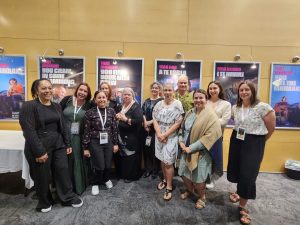
MAI ki Otago contingent at MAI hui ā-tau ki Te Kunenga ki Pūrehuroa, Massey University in Pamerston North.
Tokowhā ngā tauira Tohu Kairangi o Te Tumu e haere ana. Te rawe hoki o ngā kōrero me te whakawhanaungatanga i puta ai i reira. Kei runga noa atu te manaakitanga o ngā kaiwhakahaere nō reira, ngā mihi maioha ki a rātou. E rere hoki ana ngā mihi ki Te Kura Rangahau Tāura, ki a Rachel Sizemore kōrua ko Inano Walter i ā kōrua manaaki i a mātou, ko MAI ki Otago.
This year the annual MAI conference was hosted by Te Kunenga ki Pūrehuroa, Massey University in at the Palmerston North campus. Four PhD students from Te Tumu attended the hui. The presentations and networking opportunities were awesome. The hospitality of our hosts was amazing which we all appreciated. We also thank The Graduate Research School especially Rachel Sizemore and Inano Walter for supporting and looking after the MAI ki Otago group.
To Hell With Drowning: A Reflection
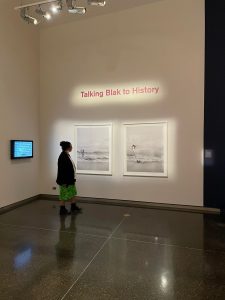
Māori scholar photographs Cook Islands scholar examining Aboriginal artwork confronting White Australian histories at the Australian National Museum, Canberra, April 2023. [click to enlarge]
This is the final reflection from our PhD students who attended the recent Australia Association for Pacific Studies conference in Canberra, by Stacey Kokaua-Balfour.
As someone who has only recently started their PhD, the recent AAPS conference was my first time attending an academic conference. I have come away with not only new questions but the awareness of new geographic and intellectual contexts that might shape those questions. What resonated most with me as someone who has operated in Pacific spaces in Aotearoa for some time, was the way our nation state and its distinct geo-political interests can shape not only how Pacific region and their peoples are framed but also what are considered the most important priorities for academic research.
AAPS was an opportunity to engage with Indigenous thinkers across cultures, nation state borders, languages, breaking across specific colonial interests in the Pacific. The Welcome to Country led by Aunty Serena Williams (Ngunnawal – Wiradjuri) best articulated the idea that as researchers, our best ideas spring from coming together and sharing the distinct and nuanced ways Indigenous peoples engage with land and each other.
Rethinking Australian Coloniality through Pacific Biography
Wanda Ieremia-Allan provides the second of the reflections from our PhD students who attended the recent AAPS conference in Canberra.
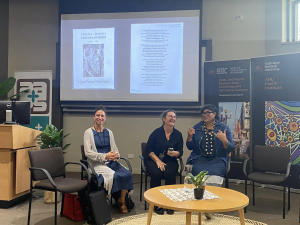
Wanda (right) alongside fellow panel presenters Hineitimoana Greensill and Pauline Reynolds [click to enlarge]
Fleets abound with Pacific scholars, creatives, activists and politicians met at the April 2023 ‘To Hell With Drowning’ Pacific Studies conference at the Australian National University (ANU) in Canberra. As a child of Sapapali’i, Sāoluafata, Safotulafai, Lalomanu, Vaie’e, Matāutu Falealili in Samoa, I extend my Fa’afetai to people of the unceded Ngunnawal and Ngambri lands (Canberra Australia) for their warm welcome and hospitality to country. Thank you also to the Australian Association for Pacific Studies (AAPS) organising committee led by Professor Katerina Teaiwa and Talei Mangioni for their care. Fa’afetai to the AAPS for the Guy Powles travel prize that made it possible for me to attend and I am grateful to my supervisors Dr. Jess Pasisi (Otago), Professor Alice Te Punga Somerville (UBC) and Tootooleaava Dr. Fanaafi Aiono Le-Tagaloa (USP Samoa) for their unwavering support and guidance. Thank you especially to Dr Jess Pasisi for the academic manaakitanga extended to many PhD students.
On a panel with Dr Pauline Reynolds of the Norfolk Island Museum and PhD student Hineitimoana Greensill, I presented my paper on Indigenous Pacific language archives and its role in ‘Rethinking Australian Coloniality through Pacific Biography’. Utilising the intersections between Professor Epeli Hau’ofa’s notion of the ‘totality of relationships’[1] and Māori scholar Professor Alice Te Punga Somerville’s poem ‘Room’[2] provided an opportunity to think about: ancestral links; ideological connections; and spaces of reckoning and recovery.
My paper focussed on Samoan historiography and the kinds of work that are made possible when we centre on Samoan language archives as sites of Indigenous knowledge production and historical recovery. This resulted in the emergence of an intellectual, geographical, linguistic and cultural Pacific expansiveness alongside the rich long standing embodied stories of Pacific connectivity that not only interrogate pervasive Australia white settler colonial histories but demand more institutional university spaces to conduct decolonial work with our languages. Samoan language archives recovered links with fellow kin, in particular South Sea Islanders of Mer Island, Torres Strait Island region where Samoan missionaries and local Mer Island people established the London Missionary Society church named ‘O le Sulu Samoa’ in 1902. Letters from Badu Islands and Vanuatu recovered family histories and brought to light the many ways in which Pacific Islanders see each other and connect over oceans of memory.
Advocating for the use of our own epistemological paradigms in archival engagement is necessary because as matua Tuaopepe Albert Wendt asserts ‘Oceania deserves more than an attempt at mundane fact; only the imagination in free flight can hope, if not to contain her, to grasp some of her shape, plumage and pain’[3]. This is the wero (challenge) set for us all.
[1] Hau’Ofa, E. (1994). Our sea of islands. The Contemporary Pacific, 148-161.
[2] https://nzpoetryshelf.com/2021/05/24/poetry-shelf-noticeboard-alice-te-punga-somervilles-room/
[3] Wendt, Albert, 1982. Towards a New Oceania. In: G. Amirthanayagam. (eds) Writers in East-West Encounter: New Cultural Bearings. London: Palgrave Macmillan, pp 202-215.
Te Tumu academic to keynote at 1869 Conference
A lot was happening in 1869. For example internationally: Wyoming granted women the right to vote; the Heinz company was founded; the Periodic Table published; and the Suez Canal opened. In New Zealand, we were in the middle of the Gold Rushes and the New Zealand Wars, and the University of Otago was founded.
This year the Australasian Victorian Studies Association and the Centre for Research on Colonial Culture are co-hosting a conference of the theme of 1869 here at Otago on 25-29 September.
One of Te Tumu’s staff members, Megan Pōtiki will be presenting a keynote lecture. Other keynote speakers include Dr. Helen Pearson (Chief Magazine Editor, of the prestigious periodical Nature which first appeared in 1869) and Professor Marion Thain (of King’s College, London). Specially invited speakers include novelist, essayist and literary scholar Dr Tina Makereti (Massey University), whose most recent novel, The Imaginary Lives of James Pōneke, was long-listed for the Ockham New Zealand Book Awards; as well as Lisa Chatfield, producer of the BBC mini-series The Luminaries and its set decorator, Daniel Birt.
If you wish to present at this conference, please see the Call For Papers below. Topics do not have to be about 1869 exactly, but events and developments from around that time. This will be an exciting conference that will run alongside heritage festival events.
Rangahau Roundup
Semester 2 has been busy on the research front for Te Tumu staff and postgrads.
Te Tumu is still progressing with Te Kōparapara, a book on Māori culture, history and contemporary society, which is designed as a textbook for MAOR102 as well as for a general audience. Prof Michael Reilly is the main driver of this project, and has been ably assisted by Dr Gianna Leoni. This book, with an array of essays mainly written by Te Tumu staff, is under contract with Auckland University Press and should appear sometime in 2017.
Faculty News
Associate Prof Jenny Bryant-Tokalau has been having a busy Research and Study Leave. She has given two presentations in the USA in the last semester: ‘Food security and other risks in a time of climate change: traditional and contemporary forms of resilience’, to the Department of Anthropology, and ‘Small Island Pacific States: Dealing with Climate Change’ to the Department of Geology at Wheaton College in Massachusetts. In December she presented ‘Working in Context: The Commercial Potential of Customary Pacific Land’ at the Aotearoa New Zealand International Development Studies Network Ninth Biennial Conference ‘Pacific Currents, Global Tides’ Wellington, and ‘Dealing with disasters and social change’ to the Asia Pacific Biocultural Health ‘Big Ideas’ Workshop, in Dunedin, December.
Jenny has also had one chapter in an edited collection appear during this period: ‘Community responses to floods in Fiji: lessons learned’ In Calabrese, John (ed.) Humanitarian Assistance and Disaster Response: Rising to the Challenge. MAP Series, Middle East Institute, Washington. August (2016) issue. Click here to access it. She also has two book reviews published in New Zealand and Pacific Studies November, 2016; and Journal of the Polynesian Society 125 (1), 2016.
Jenny is planning to return to the Solomon Islands to carry out in-depth interviews on small and medium businesses on Kastom land, as well as to finalise book edits for Palgrave MacMillan Anthropology of Disaster Series: What the Pacific Islands can teach New Zealand about Climate Change.
As previous posted, Prof Paul Tapsell spoke at the Indigenous Plenary at the WAC-8 Conference in September. Paul and Associate Prof Merata Kawharu are also part of the large three-year Mauri-Whenua-Ora project within the National Science Challenge Land and Water: Toitū te Whenua, Toiora te Wai. This project is the only fully Māori-led and Māori-integrated research programmes of all NSCs nationally, and is looking at Maori land and water based innovation including: (1) micro economy development “Pa to Plate”, (2) Shared iwi innovation for Taitokerau as a model for other iwi and (3) a regional (Te Hiku) study looking at Maori land suitable use and value chains. Merata also has a forthcoming publication, “Indigenous Entrepreneurship: Cultural Coding and the Transformation of Ngāti Whātua in New Zealand” in the Journal of the Polynesian Society, 125, 4 (2016): 385-408.
Associate Prof Lachy Paterson gave a presentation entitled ‘U.S. Slave “Humor” in New Zealand Newspapers’ at the 109th Annual Meeting of the Pacific Coast Branch of the American Historical Association at Waikoloa, Hawai’i. He is currently writing up this paper, which looked at how imported racist discourses permeated New Zealand’s English-language newspapers. Lachy returned to his ongoing obsession with Māori-language newspapers, with “The New Zealand Government’s Niupepa and their Demise” published in the New Zealand Journal of History, 50, 2 (2016): 44-67.
Together with Associate Prof Angela Wanhalla (Dept of History and Art History), he has also sent off their manuscript “He Reo Wahine: Māori Women’s Voices from the Nineteenth Century” to Auckland University Press, and it should appear sometime in 2017.
Over summer Prof Michael Reilly hopes to write a paper concerning the research relationship between William Wyatt Gill of the London Missionary Society, and Mamae of Ngāti Vara, a church minister, on Mangaia during the 19th century. In the longer run, he wants to begin writing chapters for an introduction to Māori tribal history, drawing from the draft text used as a ‘course reader’ in MAOR 207 Ngā Kōrero Nehe – Tribal Histories. Michael is passionate about this project but acknowledges that it may take several years to finish. He has also completed the final editorial corrections for a paper to be published this December, “Narrative Features and Cultural Motifs in a Cautionary Tradition from Mangaia (Cook Islands)”, in the Journal of the Polynesian Society 125, 4 (2016): 357-384.
Dr Jim Williams has a forthcoming article in the Journal of the Polynesian Society, entitled “Seafood Gardens”. Jim has a busy summer planned, fininishing off an essay for Ethnohistory, entitled “Layers of History” explaining how certain activities are repeated at powerful places, giving rise to notions of circularity of time, but layered, like whakapapa; he will also be giving a presentation in January at the American Historical Association conference in Denver. One of Jim’s students, Katrina Bryant, has just completed her Master of Physiotherapy.
In October newly graduated Dr Gianna Leoni gained a new position based in Te Tumu, that of a Ngā Pae o te Māramatanga postdoctoral fellow, with the research project “Te Ōhanga o te Pīpīwharauroa – Expressing our Economic Aspirations”. Click here for more details.
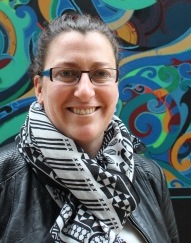 In June, Megan Pōtiki presented on her doctoral research on language loss at Ōtākou, at He Rau Tumu Kōrero IX at Te Rau Aroha Marae in Bluff. This event was run by Te Pouhere Kōrero, the national Māori historians organisation. Megan has also published two journal articles, “The Otago Peninsula: A unique identity” in Shima, 10, 1 (2016): 67-84 [Potiki-Shima-v10n1-3]; and ‘Te Haka Nā Ngā Herehere’ in Te Pouhere Kōrero 8 (2016): 6 –25, and is currently working on another article, “Māori song composition and reclamation of traditional tribal borders” based on a mōteatea she composed for the Te Tumu Kapa Haka group.
In June, Megan Pōtiki presented on her doctoral research on language loss at Ōtākou, at He Rau Tumu Kōrero IX at Te Rau Aroha Marae in Bluff. This event was run by Te Pouhere Kōrero, the national Māori historians organisation. Megan has also published two journal articles, “The Otago Peninsula: A unique identity” in Shima, 10, 1 (2016): 67-84 [Potiki-Shima-v10n1-3]; and ‘Te Haka Nā Ngā Herehere’ in Te Pouhere Kōrero 8 (2016): 6 –25, and is currently working on another article, “Māori song composition and reclamation of traditional tribal borders” based on a mōteatea she composed for the Te Tumu Kapa Haka group.
As part of Māori language week this year Tangiwai Rewi was asked to give a Library research floor talk on Wednesday 13 July on the Ngāruawāhia Turangawaewae regatta, which comes out of her doctoral research and an article last year in the Journal of the Polynesian Society. A display themed around the article was shown in the Hocken Collections for seven weeks as part of Māori language Week. Click here for more details and pictures.
Tangiwai has participated in the Ahi Pepe Resource launch 27 October and Wānanga 26-28 October. She was a collaborator in this project which created an immersion te reo Māori Moths resource depicting the 600+ species endemic to the South Island. Twelve schools were invited to the Wānanga, to participate, learn how to trap, kill and present moths for identification and preservation. Also launched that night were the bilingual and total immersion resource covering the four areas of the South Island.
Tangiwai also attended the SCANZ (Science Communicators Association NZ) conference on 14 November as part of the panel who discussed the resource and preservation of moths.
Tangiwai went north to attend the Te Awamārahi poukai on 24 November. (Poukai are ceremonial gatherings held on Kīngitanga marae.) This was an opportunity to take the photo display back to her marae especially as some of people featured in the photos come from that marae. The photo boards were put on display along with other harakeke resources found along the riverbanks. Needless to say, Tangiwai also vigorously promoted Te Tumu and the University of Otago to all the people who came to view the display.
Postgraduate News
Congratulations to Matangi Schaaf who graduates in December with a PhD; and also to Nikki Walden (Taranaki, Te Āti Awa) and Nurul Sultan with Master of Indigenous Studies degrees. Click here for more details.
Two of our PhD students are submitting in December: John Birnie and Taomi Qiliho-Tapu, and Tāwini White (Ngāi Tahu, Te Rarawa) is making the final amendments to her MA thesis. Rieko Hayakawa‘s PhD thesis ‘Possibility of Telecommunication Universal Service in the Pacific Islands; Case studies of Vanuatu, PEACESAT and USPNet’ has just passed examination. We look forward to these students graduating in the near future.
We have a new PhD student who has just started, Raaniera Te Whata (Ngāpuhi, Ngāti Porou, te Whānau a Apanui), researching communities-based Māori land development in the Bay of Islands. Raaniera comes into doctoral studies after completing an LLB in Auckland and a Master of Indigenous Studies in Te Tumu.
In August Erica Newman who is undertaking PhD research on Fijian Orphanages (1874-1970) presented at the Anthropology and Archaeology Postgraduate Symposium held here in Dunedin.
Matiu Payne (Ngāi Tahu, Ngāti Mutunga), who is researching the impact of government agencies on tikanga whāngai for his doctoral studies, has just been to the Australia New Zealand Law and History Society conference at Curtin University in Perth presenting on his PhD research.
Kelli Te Maihāroa (Waitaha) who is researching Māori peace traditions and their relevance to whānau today, has co-edited an edited collection: H. Devere, K. Te Maihāroa, & J.P. Synott (eds.) Peacebuilding and the Rights of Indigenous Peoples: Experiences and Strategies for the 21st Century, (Springer: Cham, Switzerland, 2016), which includes two co-written and one sole-authored articles by Kelli. She also has an article forthcoming, “Whanaungatanga: Relationships in a One Day Te Reo Māori School of Excellence” in Theobald, M. (Ed.) Friendships in Multilingual Settings (Sociological Studies of Children and Youth, Vol 21 (2016)). Emerald. Kelli, who is a lecturer in the College of Education, also presented at the Teacher Education Forum of Aotearoa New Zealand, in June/July in Dunedin, and at International Indigenous Research Conference in November in Auckland.
Paul Tapsell – Speaking at WAC8 Indigenous Plenary
Te Tumu’s Professor Paul Tapsell spoke at the Indigenous Plenary at the huge Eighth World Archaeological Congress held in Kyoto, 28 August-2 September. He gave a Māori perspective on “Being Pre-Indigenous” at what was a larger discussion of archaeology, history, and heritage by indigenous people from around the globe. The talk (c.16 minutes) is now available on Youtube. Check it out. Paul teaches into Te Tumu’s Indigenous Development programme.
Three Items
The Puke Ariki Trust Scholarship, valued at $5000, supports the studies of a postgraduate student whose research relates to Taranaki’s social history. Puke Ariki is Taranaki’s Museum, Library, Archive Centre based in New Plymouth, renowned for its extensive heritage collections. If you are interested in this scholarship, check out the Puke Ariki Trust Scholarship Terms and Conditions.
Associate Professor Jenny Bryant-Tokalau presented a paper to the conference ‘Islands and Oceans: Navigating Pacific Futures’ held at Auckland University, November 12-13th 2015. Jenny’s paper, entitled ‘Reforming Land Tenure in the Pacific: requirements and implications, the case of Fiji’, was chaired by former Oxfam director Barry Coates, and was part of an intensive two day workshop between University of Auckland (Pacific Studies), Auckland University of Technology, Australian National University and the University of Otago to look at areas of collaborative Pacific research.
Te Tumu PhD student Nathan Albury recently was awarded the Griffith University School of Language and Linguistics Outstanding Alumnus Award in recognition of his PhD research into folk linguistics for Te Reo Maori and Sami language. Nathan is completing his PhD at the Centre for Multilingualism in Society Across the lifespan – MultiLing (CoE), Department of Linguistics and Scandavian Studies, University of Oslo,with Dr Lyn Carter (Te Tumu) as one of the supervisors.
Paul Tapsell keynote in Vienna
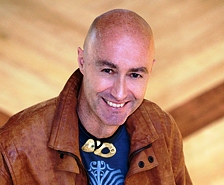 Te Tumu’s Professor Paul Tapsell is currently in Vienna as a keynote speaker at the New Zealand Studies Association conference “Empires and Cultures of the Pacific”. His address is entitled “Waka Wairua: Imagining an Other way of knowing our Pacific“.
Te Tumu’s Professor Paul Tapsell is currently in Vienna as a keynote speaker at the New Zealand Studies Association conference “Empires and Cultures of the Pacific”. His address is entitled “Waka Wairua: Imagining an Other way of knowing our Pacific“.
Click on link for the Abstract of Paul’s address.

